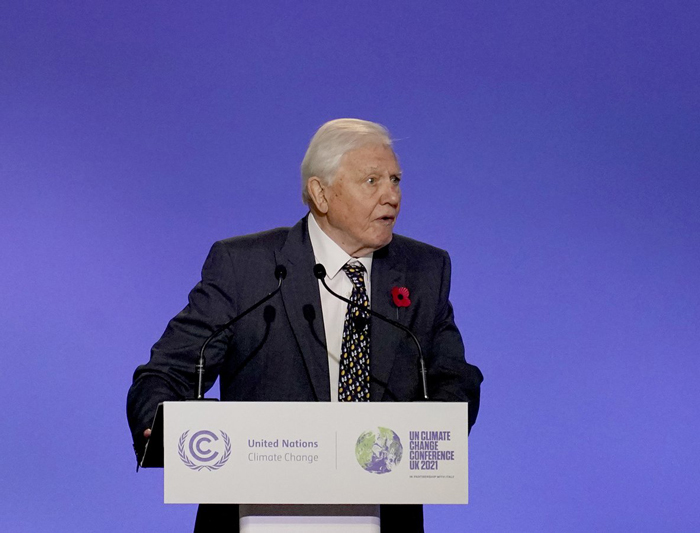
The United Nations Climate Change Conference (COP26) in Glasgow for the first two weeks of November 2021 is illustrating yet again how poorly our international institutions and governance arrangements are able (or unable) to respond to existential threats like climate change requiring urgent action.
Climate change is the epitome of a global problem respecting no boundaries and beyond the management capacity of any one country. It also interacts with the planetary loss of biodiversity and spreading global pollution with amplifying impacts on humans and nature. Many of its effects are irredeemable at any human scale, and irreversible tipping points are very near. Only the most urgent action to transform our economies and society might avoid a catastrophic future. As an environmental scientist and former international official, I have been warning of this for more than 50 years.

The failure of voluntary efforts
But governance has not globalized to the scale and acceleration of the problems. Giving primacy to national sovereignty has left global efforts voluntary. Yet national sovereignty is already greatly eroded in a globalised economy and society dominated by the wealthiest and most powerful. What is needed today is to protect national autonomy through stronger global governance.
Our great crisis today is implementation, demonstrating governance failures to protect the public good. Governments can always ignore or opt out of global agreements. There is no enforcement. Sovereignty too often serves as a shield to hide the misdeeds of national leaders, not to mention the power of vested and corrupt interests. The result is a failure of trust, because governments are not trustworthy, hindering global agreement and collaboration.
Government is normal
At the national level, we accept principles of governance for the common good, with institutions that define our national identity: a head-of-state and executive, a legislature or parliament to pass laws, mechanisms for implementation and enforcement, and processes for judicial review. At the national level, respect for the law is the norm, and lawbreakers are punished in the common interest. Protection of our individual freedom and autonomy includes protection from threats of others.
Climate change is the best opportunity for a breakthrough in global governance, as the science is so obvious and the threat so immediate.
We must now extend the same principles of governance to the global level. Our Earth is our only home and it is in extreme danger. Humans are now the dominant species, and our oneness and our need to build a just and harmonious global civilisation are now obvious, requiring united action.
Global governance for climate change
The urgency of the climate crisis, among others, leaves no time for the present laborious pace of intergovernmental negotiation requiring consensus, pushing to the lowest common denominator, or agreements undertaken voluntarily as with international conventions, allowing free-riders who benefit without making any effort. This is no way to preserve our global common interest as defined by the latest science.
Climate change is the best opportunity for a breakthrough in global governance, as the science is so obvious and the threat so immediate. This is our chance to create an institution, perhaps a Global Environment Agency, for those critical environmental issues of the global common good that require urgent and effective action by all states, multinational corporations and other actors. We have explored this in detail in a recent paper for the Climate Governance Commission, and I want to share some key points here.
Necessary functions
What would be the design criteria and functions for such an institution?
Knowledge provision with the capacity to determine planetary environmental boundaries and system requirements based on the best science, through reinforced and integrated scientific advisory processes.
Deliberative and legislative functions with the authority to adopt binding legislation on the respect of those limits, and to determine through consultative processes the just distribution of responsibilities based on historic and actual contributions.
Enabling and implementing the decisions taken with capacities to enforce those responsibilities on states and other actors, and the means to assist those that lack the necessary capacities and competences.
Trust and justice building as an essential characteristic, with mechanisms to enable judicial review of interpretations and settlement of disputes as necessary.
Learning and reflexivity will also be necessary to ensure adaptability to complexity and uncertainty, learning from past experience and present environmental change to keep abreast of our evolving global environmental situation with inevitable surprises.
Orchestration, not bureaucracy
There are already many available institutions and capacities within the UN system and beyond that could contribute to global governance of climate change and other pressing global environmental challenges. The aim, therefore, would not be a massive global bureaucracy but an orchestrator with global authority over polynodal processes and institutions with an emphasis on subsidiarity, like an orchestra conductor adopting a score and leading many instruments to produce harmonious music.
The Agency should have the authority to adopt the global rules, norms and values that would ensure the safeguarding of the planetary environment for the common good, as well as the right of everyone to a clean, safe, productive human environment. It should be endowed with adequate supervision authority to ensure the necessary rules are followed. It could develop new accounting systems for the global environmental capital inherent in a biosphere with natural resources and processes that maintain a planet suitable for life, such as carbon accounts for sources and sinks, to guide us away from climate catastrophe and towards sustainability.
Building on what exists
We could build on UNEP and the UN Environment Assembly, which already have many relevant competencies, but are under-resourced and can only catalyse and coordinate, not legislate and enforce. The Agency could collaborate with, build coherence between, and eventually incorporate the relevant international conventions.
The Agency’s position within the UN system will depend on whether there are wider UN reforms giving, for example, legislative authority to the General Assembly or binding judicial capacity to the International Court of Justice. In their absence, granting such authority more narrowly to an institution to act on the planetary environmental crises may be more politically acceptable.
States would need to give up some sovereignty for these well-defined global issues in the common good, but this would be balanced by guarantees of national autonomy in their implementation, through processes that build trust, like the European Union starting with a Coal and Steel Community. This would be the most practical step to ensure the effective implementation of the Paris Agreement, the decisions from COP26, and even the Sustainable Development Goals.
Further details are included in my paper with Sylvia Karlsson-Vinkhuyzen for the Climate Governance Commission: Towards a Global Environment Agency: Effective Governance for Shared Ecological Risks.


